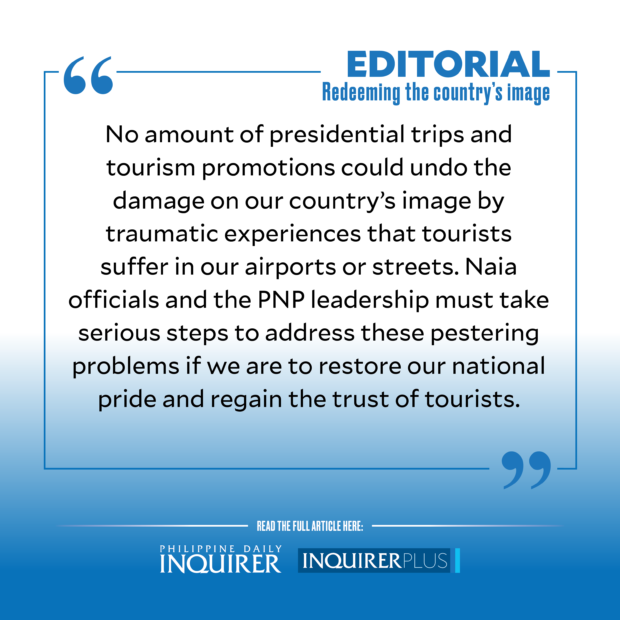Redeeming the country’s image
Three incidents in recent days have dealt a blow to President Marcos Jr.’s efforts to sell the country to investors and tourists during his frequent foreign trips, and rendered superfluous a senator’s posturing against a Hollywood movie that supposedly puts the Philippines in a bad light.
Last week, two personnel from the Office of Transportation Security (OTS) at the Ninoy Aquino International Airport (Naia) were reported to have stolen 20,000 yen (around P8,000) from a Thai passenger when his bag passed through the X-ray screening machine. Video clips showed the woman slipping the cash into the coat pocket of another security staff. According to Kitja Thabthim, he was ignored when he reported the theft and demanded to see the CCTV footage. Informed that the incident had been caught on another passenger’s phone camera, the woman took them aside and returned the money, but refused to let them go until they deleted the clips. Later, the passengers managed to retrieve the videos, which have since been broadcast on Thai TV. Early Wednesday, another OTS security officer was arrested after he was caught stealing a watch from a Chinese passenger from a tray during a security screening at Naia Terminal 1.
Article continues after this advertisementDays before these embarrassing incidents, on Feb. 19, a tourist from New Zealand was held up and shot dead by motorcycle-riding men on a street in Makati, the country’s premier business district. The Kiwi, who was walking late at night with his girlfriend, had attempted to wrest the gun from the hold-upper who later fled with the woman’s wallet and smartphone.
Predictably, government functionaries scrambled for damage control. In a statement on Monday, the OTS said the erring personnel “shall not only be dismissed from the service but shall also be put behind bars for their criminal acts that tarnish the reputation and integrity not only of OTS but the entire country in general.”
The Philippine National Police meanwhile issued a wanted poster containing a photo of the suspect and offered a P500,000 bounty that prompted a suspect to surrender, but only “to clear [his] name.” National Capital Region Police Office chief Maj. Gen. Jonnel Estomo also issued a statement ensuring that “the victim would be given justice,” adding that the police force was “not only ready to serve Filipinos but also foreign nationals visiting the country.”
Article continues after this advertisementHis statement is hardly reassuring. Despite PNP chief Gen. Rodolfo Azurin Jr.’s recent claim that the country’s crime rate has dropped by 6 percent from July to December last year, the attacks on and subsequent death of three local officials in less than a week have remained unresolved.
At the Naia, the extortion and robbery cases cap a string of unseemly incidents that have tainted the foreign tourists’ first impression of the country. Perennially named as one of the world’s worst airport, Naia was named “third most stressful in Asia” in the November 2022 report by the travel website hawaiianislands.com. More than just the deplorable queues, the lack of amenities and services, poorly maintained premises, unexplained delays, and inadequate personnel, the negative ratings may also be traced to the scams, bribery, and extortion schemes that plague the facility.
How many passengers in 2015 were collared, threatened with jail, and fined hefty sums for the live bullet that was inexplicably found in their baggage in what became known as the “tanim-bala” scheme? Last month, K-pop fans were outraged at a video clip showing the unprofessional conduct of a female security personnel giggling as she thoroughly frisked a visiting K-pop star. The OTS said it was investigating the case for possible administrative sanctions against the personnel.
Recall as well Sen. Risa Hontiveros’ series of exposes involving immigration personnel at the airport who were bribed into allowing in Chinese nationals without undergoing standard screening procedures in what became known as the “pastillas” scheme. Complicit airport staff were also blamed for the trafficking of several Filipinos to Myanmar and Cambodia, where they were forced to recruit clients in cryptocurrency scams.
Indeed, much remains to be done if the OTS were to live up to its promise not to tolerate corrupt and illegal acts, and to be serious in cleaning its ranks. As noted by that Thai tourist, there was “no security guard, no police around,” like there was a syndicate abetting extortion within the airport. More CCTV cameras, regular staff rotation, transparent screening barriers, and security guards monitoring OTS procedures could be a start.
No amount of presidential trips and tourism promotions could undo the damage on our country’s image by traumatic experiences that tourists suffer in our airports or streets. Naia officials and the PNP leadership must take serious steps to address these pestering problems if we are to restore our national pride and regain the trust of tourists.

















